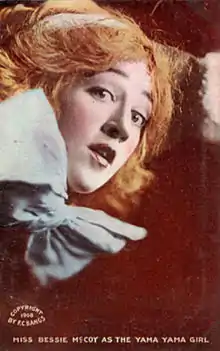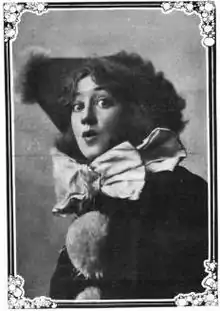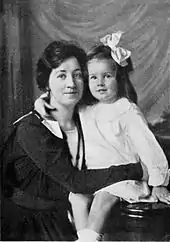Bessie McCoy
Bessie McCoy (1888 – August 16, 1931) was an Irish-American Vaudeville star best known for her 1908 hit song and dance routine "The Yama Yama Man", for which she became known as "The Yama Yama Girl". She married war correspondent Richard Harding Davis.[1]

Bessie McCoy | |
|---|---|
 Bessie McCoy in her Yama Yama Man outfit, 1908. | |
| Born | Elizabeth Genevieve McEvoy 1888 Ireland |
| Died | August 16, 1931 (aged 43) Bayonne, France |
| Occupation(s) | Singer, actress |
| Spouse | |
| Children | 1 |

McCoy was born in Ireland as Elizabeth Genevieve McEvoy.[2][1] Her mother and father were a vaudeville act known as McCoy and McEvoy, they were Irish clog dancers. Bessie, along with her sister, entered stage in their teens as chorus girls.[1] She appeared in a number of Broadway musicals and made a breakthrough in the play "The Echo". She was given the "Yama Yama Man" song in the 1908 revue Three Twins.
She became famous for her lazy, husky singing while performing unusual acrobatic dance routines while dressed in a clowns pajama suit with a fools cap topped by a puff ball.[1]
She met Harding Davis at this time, and they were married in 1912 when she was 24 years old. After Harding's early death in 1916 from a heart-attack, McCoy retired from stage work and lived in the Davis' Connecticut estate.
In 1931, while in France with her 16-year-old daughter Hope, she died suddenly after an emergency intestinal operation.[1]
References
- "Bessie McCoy, Yama Yama Girl, Dies in France". Chicago Daily Tribune. August 19, 1931. Archived from the original on December 14, 2019. Retrieved March 30, 2017.
Scroll down the blank grey page to reach the highlighted article.
- "Two Widows". Time. August 31, 1931. Archived from the original on 2008-12-15. Retrieved March 30, 2017. Additional archives: December 15, 2008.
External links
![]() Media related to Bessie McCoy at Wikimedia Commons
Media related to Bessie McCoy at Wikimedia Commons
- Bessie McCoy at the Internet Broadway Database
- Bessie McCoy at Playbill Vault
- David S. Shields. "Bessie McCoy Davis". University of South Carolina. Archived from the original on 2014-08-10.
- Stars of Vaudeville #362: Bessie McCoy at the Wayback Machine (archived 2011-11-07)